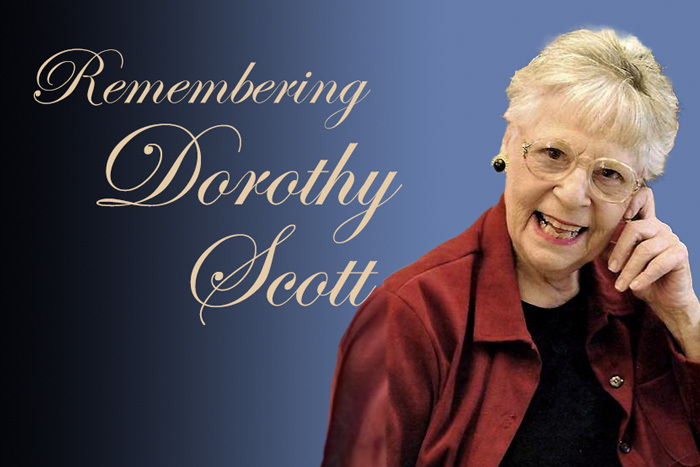Decades-Long Resident and Volunteer Dorothy Scott: In Memoriam


Decades-Long Resident and Volunteer Dorothy Scott: In Memoriam

There is something special about each and every resident of Los Angeles Jewish Health, and Dorothy Scott was no exception. Her daughter, Mary Jane Dante, attributes Dorothy's impact (at Los Angeles Jewish Health and in the wider world) to natural charisma. "My mom was gifted," she says. "She could walk into a room, learn people's names, and retain the information; by the time she would leave, she would have developed a rapport with everybody there. She was truly the 'hostess with the mostest'—congenial, funny and absolutely lovely in every way."
Dorothy, incredibly, lived at Los Angeles Jewish Health for nearly three decades before her recent passing this March at 100 years old. She left an amazing impression wherever she went. As a young woman, she parlayed her natural beauty into a modeling career. She loved to sing, dance, and entertain and would perform for the United Service Organizations (USO), often opening for Frank Sinatra. In Los Angeles, Ol' Blue Eyes was a regular part of Dorothy's social circle: She and her beloved husband, Mark—a sportscaster for the PCL Hollywood Stars baseball team and one of the originators and host of TV's "Homerun Derby" – regularly spent time with the Sinatras, Dean Martin, Peter Lawford, and other members of the Rat Pack. "My parents made an incredibly dashing, handsome couple, and they fit right in with Hollywood's in-crowd," Mary Jane says.
Mark died in 1960 at the age of 45, leaving Dorothy to raise their two young children on her own. Hollywood glamour receded into the distance as she went back to work full-time, earning a living with fashion-related jobs in retail. "Mom never returned to acting or dancing after Dad was gone; she felt she had to be serious and support us kids. She was so dedicated to us—she wanted us to be of good character and to be happy and successful, and she did everything she could to make that happen," Mary Jane says.
Dorothy never remarried, and following the Northridge earthquake in 1994—after 34 years of "flying solo"— she was tired of living on her own. "Mom was only 72, and she was incredibly healthy, but she wanted to be part of a community, and she chose Los Angeles Jewish Health," Mary Jane says. "My Aunt Estelle was living there, and Mom went to visit all the time, so she already felt comfortable and knew it was the right place for her."
Once she moved in, she never looked back. "Mom made a life at Los Angeles Jewish Health—she didn't expect to be waited on," Mary Jane says. "She immediately started volunteering in Arts & Crafts; she delivered the mail; she would take prospective families on tours of Eisenberg Village, where she initially lived." She also completed coursework to become a para-chaplain, helping to meet the spiritual needs of her fellow residents and patients at Encino Hospital. Working in the synagogue at Los Angeles Jewish Health was very important to her, as well.
"Dorothy was integral to our religious life here," says Rabbi Ron Goldberg, rabbi of Los Angeles Jewish Health's Eisenberg Village campus. "Her work was valued and appreciated, and her fellow residents adored her. She was very much a presence at Los Angeles Jewish Health."
In recognition of her many contributions to community, Dorothy was honored in 2006 by the Los Angeles City Attorney's Office with its LA Pearls Senior Citizens of the Year Award. She also received many awards such as a certificate of appreciation from UCLA School of Medicine for her participation in their Multicampus Program for Geriatric Medicine and Gerontology, and recognition for completing the training program for Los Angeles Jewish Health Hospice Services. At Los Angeles Jewish Health, Dorothy was honored as "Resident of the Year," and she earned accolades for her musical achievement. In addition, she received a special certificate thanking her for "the time, effort, and love" she brought to every endeavor. "Mom channeled her passion into service, and she gave of herself for 20 years, until it was time to have some of that love returned," Mary Jane says.
During her mid 90s, Dorothy's mind remained sharp, but her body began to slow—and as she accessed more of Los Angeles Jewish Health's services, the staff treated her like royalty. "They took care of her like she was the queen of England," Mary Jane says. "She wouldn't have lived till 100 if she hadn't had the love and support of the staff, the nurses, and all the other people at Los Angeles Jewish Health. There simply is no better care."
After a century of living, Dorothy was ready to rest. "Her faculties were still amazing for that age, and she didn't suffer, which makes me eternally grateful," Mary Jane says. "As hard as it is not to have her here anymore, she had a very full life, and I'm thankful to Los Angeles Jewish Health for enabling her to make the most of every day."